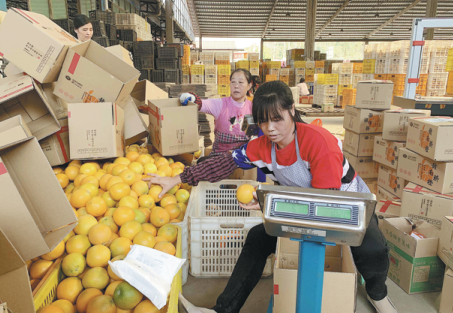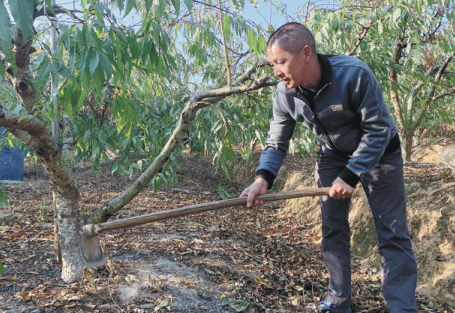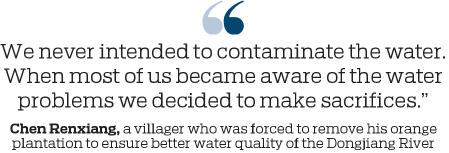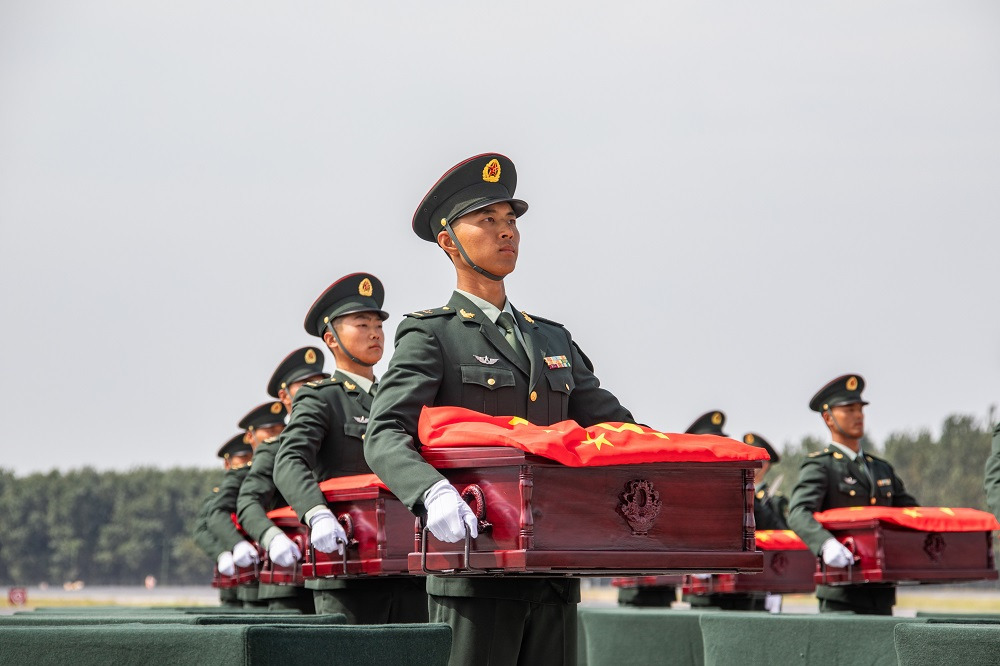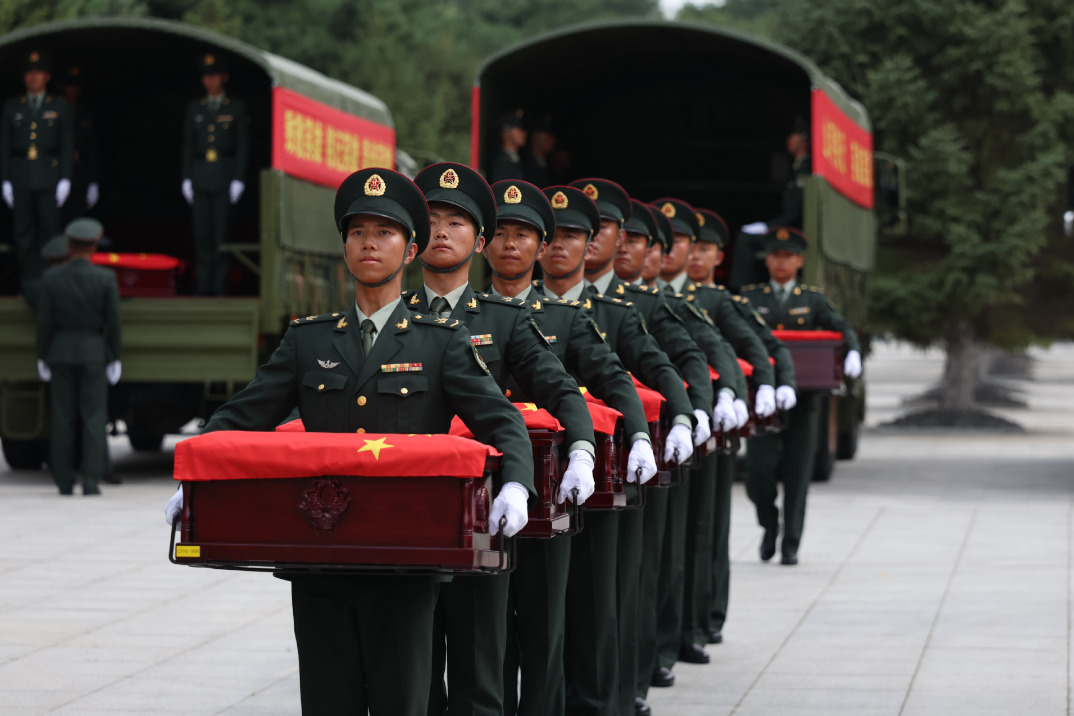BITTERSWEET HARVEST
How orange growers sacrificed income to help make Hong Kong's water safe, Aybek Askhar reports from Xunwu, Jiangxi.

In 2012, orange grower Huang Zhiwen was angry when he learned the local government had issued an order for the removal of all the orchards around a nearby reservoir, including his citrus trees.
Born and raised in the small village of Sanbiao in Xunwu county, Jiangxi province, the 49-year-old had taken care of the citrus trees for almost 20 years.
"They became my 'money tree' after the first harvest. How could I just say 'yes' when they told me to chop down all the trees?" he said.
His orchard, with more than 1,000 orange trees, earned nearly 10,000 yuan ($1,420) a year, and was the family's main source of income.
"After October was the harvest season for my navel oranges, and I usually collected almost 500 kilograms of ripe oranges. After the fruit was turned into cash, you could hardly imagine how happy it made a grower like me, who used to be very poor," Huang said.
Orange county
Huang's county shares a famous past with other parts of the province as it is considered the cradle of the Chinese revolution. Many leaders of the Communist Party lived in and organized revolutionary activities from Xunwu, located in Jiangxi's south. It is where Mao Zedong wrote Report from Xunwu, a seminal 1930 investigation into the people, economy, administration and social structure of the then obscure county.
But after the country's reform and opening-up in 1978, Jiangxi did not fully seize the development opportunities available the same way that the neighboring province of Guangdong did. In addition, most parts of Jiangxi are surrounded by mountains, which contributed to the province's economy remaining undeveloped.
"I still remember when people from Guangdong preferred to work and live in Jiangxi," said Chen Renxiang, a 50-year-old Sanbiao villager.
"But after 1978, you hardly saw any outsiders and many of our people went to Guangdong to make a living."
The situation in Xunwu and southern areas of Jiangxi improved in the early 1990s when navel oranges were introduced from North America. The right climate and plentiful water resources encouraged the growers to plant citrus trees.
"Most of the farmers in my county started to grow navel oranges," Chen said. "There were citrus trees all over the mountains, and like Huang our incomes all increased. One-third of the farmers in the villages bought houses. It was probably the best time for farmers in Xunwu, a situation which is difficult to replicate today."
Green menace
While extensive planting changed the farmers' lives, it also led to environmental problems.
Pesticides used to help produce bumper crops of oranges leached chemicals into the soil, and in the rainy season, these chemicals were washed into streams, rivers, and eventually, a nearby reservoir. When the temperatures climbed in the hot season, blue-green algae started to appear in the water.
Blue-green algae is a cyanobacteria that thrives in warm, nutrientrich water. As more chemicals emptied into the reservoir, the bacteria grew quickly, forming "blooms", which produced cyanotoxins that can make humans and animals sick.
In 2012, hydrology experts found the bacteria was being produced on a massive scale and contaminating Xunwu's water supply. The local government took drastic measures. Farmers were forced to stop planting new orange trees and ordered to chop down all the citrus trees close to the reservoir.
"I knew the bacteria was harmful, but once you have a better life it is really hard to go back and find yourself in financial dire straits," said Huang, adding he had no choice but to cut down all his "money trees".
But the problems created by the contaminated reservoir not only posed a threat to the health of locals, but also to tens of thousands of people 450 kilometers away.
Helping Hong Kong
In 1963, Hong Kong experienced a drought, and at its height, the city only had enough water reserves to last 43 days.
Local associations, including the Chinese General Chamber of Commerce and the Hong Kong Federation of Trade Unions, sought assistance from the central government. In December 1963, the government committed 38 million yuan to the construction of the Dongjiang-Shenzhen Water Supply System.
On March 1, 1965, about 68 million cubic meters of water began flowing into Hong Kong from the Dongjiang River.
The main source of the Dongjiang River is at the foot of the Yajibo mountain close to Huang's orange plantation and many others.
Over the past five decades and after three large-scale expansion programs, the project increased its annual water supply to Hong Kong from 22 million cubic meters to about 820 million cu m. The Dongjiang-Shenzhen Water Supply System now supplies up to 80 percent of the city's freshwater.
"I'd known since I was a kid that we share the water of the Dongjiang River with Hong Kong," said Chen, the 50-year-old farmer, who was also forced to remove his orange plantation. "We never intended to contaminate the water. When most of us became aware of the water problems we decided to make sacrifices," he said.
After an internal struggle and discussions with his family, Huang decided to chop down all the orange trees himself. It took him five days to fell 1,000 trees. For his sacrifice he received 110-130 yuan compensation for each tree. One hectare of land supports about 60 orange trees.
Zeng Kunming, Party head of the local township said: "I understand his loss, and his final decision proved that he was not a selfish man."
He added that poultry farmers were also forced to move to other places as excrement from their birds had also contaminated the river. "I can say that all the farmers have made efforts to provide better water quality for the rest," he said.
Huang said: "The compensation I received from the government relieved my economic pressure. But still, the best days were gone, and soon it was not only over for the people farming near the river source but for all the orchardists in Xunwu."
In all, 370 households around the water source relying on oranges for income were forced to chop down their citrus trees.
Natural causes
But mother nature also played a major role in deciding the fate of the orange growers.
In late 2012, citrus greening disease hit the southern part of Jiangxi province, and within two years one-third of the citrus trees in Xunwu county died.
The disease, also known as Citrus Huanglongbing (HLB), is caused by a bacteria and results in bitter, misshapen oranges with a mottled appearance.
"Since 2012, as more citrus trees were affected, farmers have no longer been willing to grow navel oranges and our income has declined rapidly," Huang said. "Our local economy has been going backward."
Farmers turned to other crops, and got used to living on lower incomes.
"It was the worst news, and the consequences are still affecting the locals' lives today," Huang said. "To ensure better water quality for all the people depending on the Dongjiang River, villagers in Xunwu have made enormous sacrifices, including giving up their ancestral homes."
In 2015, Zhu Meifang, 49, a farmer who lived in the small village of Taihu on a mountainside in Xunwu county, received an order from the local government to leave his land. Along with two other villages close to the reservoir, they were ordered to vacate their farms, as their farming practices were directly damaging the water source.
"I'd been living in Taihu for more than 60 years, and it is also my ancestral home. I was reluctant to leave, but to my surprise my family members, especially my sons, were happy to leave the mountain," Zhu said.
"I found most of the younger generation in our village was willing to move. In fact, life is quite inconvenient there as the local infrastructure is pretty poor. I understand them and, like me, the majority of villagers decided to move," he added.
At the end of 2015, a total of 1,153 people in Taihu had moved to the Xunwu township where the local government had built new houses and community facilities for them.
Villager He Jiabin, 56, said his son not only got a job there, but also married a local woman.
"I am quite satisfied with where I live now, and younger generations are even more pleased," he said. "Everything has become easier since we moved here. Our new community is close to the industrial zone where people can easily find a job," he added.
Huang said all the farmers had made sacrifices to ensure a better life and environment for others.
"We believe there is no gain if there is no pain," he said. "I hope more people can understand what we did, and treasure the fruits of it."
